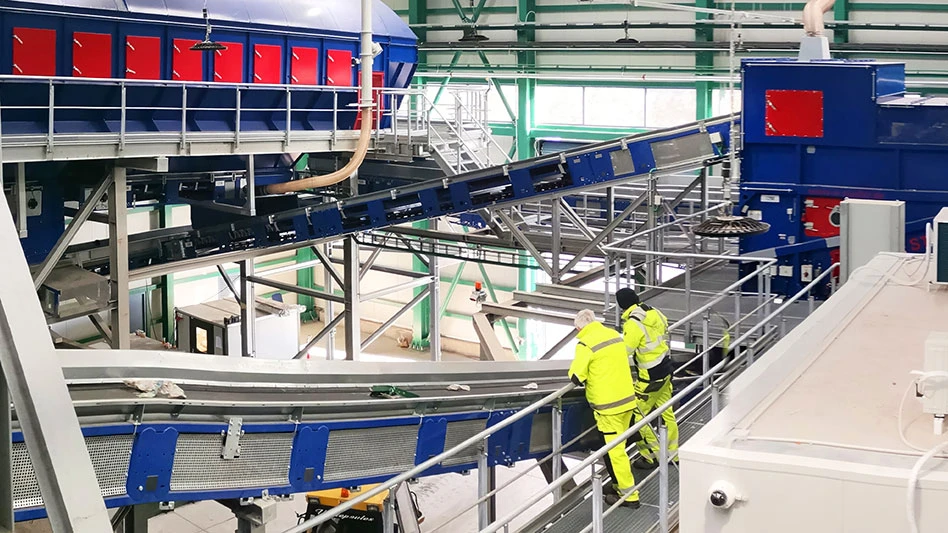
Photo courtesy of Stadler
Terna Energy, a Greek renewable energy company that is part of the Gek Terna Group, has worked with Stadler, a provider of turnkey recycling and sorting plants based in Altshausen, Germany, to commission the startup of a material recovery facility (MRF) and compost refinement plant in Tripoli, Greece. Stadler says it plans to commission two other plants with Terna Energy in Sparta and Kalamata, Greece, as well.
Stadler says the sorting plant receives municipal solid waste (MSW) with an input capacity of 30 tons per hour (tph) to 40 tph in a single line.
According to Stadler, the new Tripoli MRF offers a high degree of automation, efficiency and capacity to adapt to changing material composition. The Tripoli MRF produces consistently high-quality output, achieving a recovery rate of above 90 percent for organic fraction, plastic containers, bottles and paper and above 80 percent for biofilms and polyethylene films. The MRF also is designed to facilitate maintenance, with easy access to all components and motors for service.
Stadler reports that its design team developed the plant to deliver the high-quality output required by Terna Energy, addressing the challenge presented by the waste stream in the region. “The Peloponnese [region of Greece] is a very touristic region, and this has an effect on the composition of the waste, with high variations in seasonal consumption and diversity of packaging,” says Dimitris Blanas, head of sales for Greece and the Middle East at Stadler.
The Tripoli MRF’s process begins with two trommel screens, then a Stadler STT5000 ballistic separator that separates the rolling, flat and screened fractions. At this stage, Pellenc ST Compact optical sorters are integrated with Stadler’s high-speed conveyors, sorting waste by material and color on the two main lines, including a 2D line for flat objects for objects, such as mixed paper, cardboard and film, and a 3D line for hollow objects, such as bottles, containers and trays. Stadler says the sorters are both compact and have low energy consumption levels.
A collaborative approach
Blanas says Stadler had a “very short time” to complete equipment assembly, as the plant was required to run at full capacity on the first day of hot commissioning due to high volumes of municipal waste arriving and the lack of storage facilities. He says close collaboration with the teams from Terna Energy, technological partner Pellenc ST and suppliers was key to delivering on time. Blanas says, “We focused on effective coordination of all the teams, as well as careful timing of deliveries ahead of assembly to avoid wasting any time. Also, detailed checks and meticulous preparation throughout the assembly and cold commissioning phases were critical.”
Steve Halpin-Gosset, regional sales director of South Europe at Pellenc ST, adds, “We have been working with Stadler for many years and have built a strong partnership. The quality of our relationship and the smooth interactions between our teams have guaranteed the success of this project.”
As part of its partnership with Terna Energy, Stadler says it has designed two additional MRF and compost refinement plants with similar characteristics and capacity, which are expected to begin operations this fall. Stadler adds that it will support the three plants with a local service team and a dedicated maintenance storage center.
Latest from Recycling Today
- BMW Group, Encory launch 'direct recycling’ of batteries
- Loom Carbon, RTI International partner to scale textile recycling technology
- Goodwill Industries of West Michigan, American Glass Mosaics partner to divert glass from landfill
- CARI forms federal advocacy partnership
- Monthly packaging papers shipments down in November
- STEEL Act aims to enhance trade enforcement to prevent dumping of steel in the US
- San Francisco schools introduce compostable lunch trays
- Aduro graduates from Shell GameChanger program





